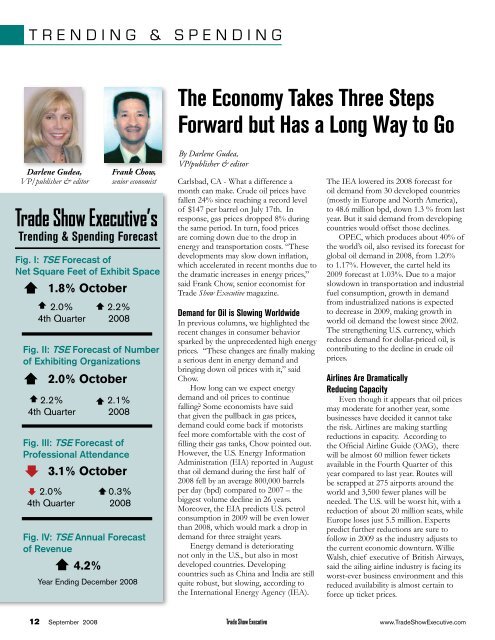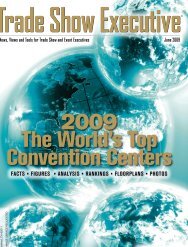the September 2008 Issue in PDF Format - Trade Show Executive
the September 2008 Issue in PDF Format - Trade Show Executive
the September 2008 Issue in PDF Format - Trade Show Executive
You also want an ePaper? Increase the reach of your titles
YUMPU automatically turns print PDFs into web optimized ePapers that Google loves.
T r e n d i n g & S p e n d i n g<br />
The Economy Takes Three Steps<br />
Forward but Has a Long Way to Go<br />
Darlene Gudea,<br />
VP/publisher & editor<br />
<strong>Trade</strong> <strong>Show</strong> <strong>Executive</strong>’s<br />
Trend<strong>in</strong>g & Spend<strong>in</strong>g Forecast<br />
Fig. I: TSE Forecast of<br />
Net Square Feet of Exhibit Space<br />
1.8% October<br />
2.0%<br />
4th Quarter<br />
2.2%<br />
<strong>2008</strong><br />
Fig. II: TSE Forecast of Number<br />
of Exhibit<strong>in</strong>g Organizations<br />
2.0% October<br />
2.2%<br />
4th Quarter<br />
2.1%<br />
<strong>2008</strong><br />
Fig. IlI: TSE Forecast of<br />
Professional Attendance<br />
3.1% October<br />
2.0%<br />
4th Quarter<br />
0.3%<br />
<strong>2008</strong><br />
Fig. lV: TSE Annual Forecast<br />
of Revenue<br />
4.2%<br />
Frank Chow,<br />
senior economist<br />
Year End<strong>in</strong>g December <strong>2008</strong><br />
By Darlene Gudea,<br />
VP/publisher & editor<br />
Carlsbad, CA - What a difference a<br />
month can make. Crude oil prices have<br />
fallen 24% s<strong>in</strong>ce reach<strong>in</strong>g a record level<br />
of $147 per barrel on July 17th. In<br />
response, gas prices dropped 8% dur<strong>in</strong>g<br />
<strong>the</strong> same period. In turn, food prices<br />
are com<strong>in</strong>g down due to <strong>the</strong> drop <strong>in</strong><br />
energy and transportation costs. “These<br />
developments may slow down <strong>in</strong>flation,<br />
which accelerated <strong>in</strong> recent months due to<br />
<strong>the</strong> dramatic <strong>in</strong>creases <strong>in</strong> energy prices,”<br />
said Frank Chow, senior economist for<br />
<strong>Trade</strong> <strong>Show</strong> <strong>Executive</strong> magaz<strong>in</strong>e.<br />
Demand for Oil is Slow<strong>in</strong>g Worldwide<br />
In previous columns, we highlighted <strong>the</strong><br />
recent changes <strong>in</strong> consumer behavior<br />
sparked by <strong>the</strong> unprecedented high energy<br />
prices. “These changes are f<strong>in</strong>ally mak<strong>in</strong>g<br />
a serious dent <strong>in</strong> energy demand and<br />
br<strong>in</strong>g<strong>in</strong>g down oil prices with it,” said<br />
Chow.<br />
How long can we expect energy<br />
demand and oil prices to cont<strong>in</strong>ue<br />
fall<strong>in</strong>g? Some economists have said<br />
that given <strong>the</strong> pullback <strong>in</strong> gas prices,<br />
demand could come back if motorists<br />
feel more comfortable with <strong>the</strong> cost of<br />
fill<strong>in</strong>g <strong>the</strong>ir gas tanks, Chow po<strong>in</strong>ted out.<br />
However, <strong>the</strong> U.S. Energy Information<br />
Adm<strong>in</strong>istration (EIA) reported <strong>in</strong> August<br />
that oil demand dur<strong>in</strong>g <strong>the</strong> first half of<br />
<strong>2008</strong> fell by an average 800,000 barrels<br />
per day (bpd) compared to 2007 – <strong>the</strong><br />
biggest volume decl<strong>in</strong>e <strong>in</strong> 26 years.<br />
Moreover, <strong>the</strong> EIA predicts U.S. petrol<br />
consumption <strong>in</strong> 2009 will be even lower<br />
than <strong>2008</strong>, which would mark a drop <strong>in</strong><br />
demand for three straight years.<br />
Energy demand is deteriorat<strong>in</strong>g<br />
not only <strong>in</strong> <strong>the</strong> U.S., but also <strong>in</strong> most<br />
developed countries. Develop<strong>in</strong>g<br />
countries such as Ch<strong>in</strong>a and India are still<br />
quite robust, but slow<strong>in</strong>g, accord<strong>in</strong>g to<br />
<strong>the</strong> International Energy Agency (IEA).<br />
The IEA lowered its <strong>2008</strong> forecast for<br />
oil demand from 30 developed countries<br />
(mostly <strong>in</strong> Europe and North America),<br />
to 48.6 million bpd, down 1.3 % from last<br />
year. But it said demand from develop<strong>in</strong>g<br />
countries would offset those decl<strong>in</strong>es.<br />
OPEC, which produces about 40% of<br />
<strong>the</strong> world’s oil, also revised its forecast for<br />
global oil demand <strong>in</strong> <strong>2008</strong>, from 1.20%<br />
to 1.17%. However, <strong>the</strong> cartel held its<br />
2009 forecast at 1.03%. Due to a major<br />
slowdown <strong>in</strong> transportation and <strong>in</strong>dustrial<br />
fuel consumption, growth <strong>in</strong> demand<br />
from <strong>in</strong>dustrialized nations is expected<br />
to decrease <strong>in</strong> 2009, mak<strong>in</strong>g growth <strong>in</strong><br />
world oil demand <strong>the</strong> lowest s<strong>in</strong>ce 2002.<br />
The streng<strong>the</strong>n<strong>in</strong>g U.S. currency, which<br />
reduces demand for dollar-priced oil, is<br />
contribut<strong>in</strong>g to <strong>the</strong> decl<strong>in</strong>e <strong>in</strong> crude oil<br />
prices.<br />
Airl<strong>in</strong>es Are Dramatically<br />
Reduc<strong>in</strong>g Capacity<br />
Even though it appears that oil prices<br />
may moderate for ano<strong>the</strong>r year, some<br />
bus<strong>in</strong>esses have decided it cannot take<br />
<strong>the</strong> risk. Airl<strong>in</strong>es are mak<strong>in</strong>g startl<strong>in</strong>g<br />
reductions <strong>in</strong> capacity. Accord<strong>in</strong>g to<br />
<strong>the</strong> Official Airl<strong>in</strong>e Guide (OAG), <strong>the</strong>re<br />
will be almost 60 million fewer tickets<br />
available <strong>in</strong> <strong>the</strong> Fourth Quarter of this<br />
year compared to last year. Routes will<br />
be scrapped at 275 airports around <strong>the</strong><br />
world and 3,500 fewer planes will be<br />
needed. The U.S. will be worst hit, with a<br />
reduction of about 20 million seats, while<br />
Europe loses just 5.5 million. Experts<br />
predict fur<strong>the</strong>r reductions are sure to<br />
follow <strong>in</strong> 2009 as <strong>the</strong> <strong>in</strong>dustry adjusts to<br />
<strong>the</strong> current economic downturn. Willie<br />
Walsh, chief executive of British Airways,<br />
said <strong>the</strong> ail<strong>in</strong>g airl<strong>in</strong>e <strong>in</strong>dustry is fac<strong>in</strong>g its<br />
worst-ever bus<strong>in</strong>ess environment and this<br />
reduced availability is almost certa<strong>in</strong> to<br />
force up ticket prices.<br />
12 <strong>September</strong> <strong>2008</strong> <strong>Trade</strong> <strong>Show</strong> <strong>Executive</strong> www.<strong>Trade</strong><strong>Show</strong><strong>Executive</strong>.com
















